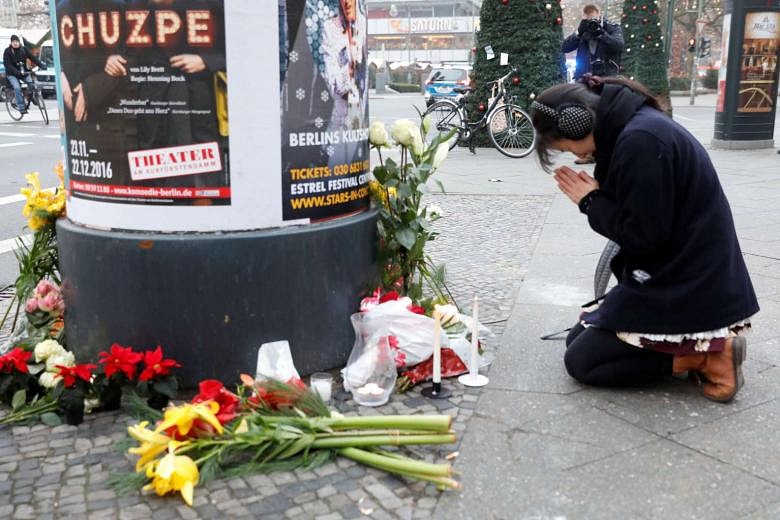PARIS (AFP) - Even the best-laid security plans cannot protect an open-air event against the lethal potency of a truck attack like those carried out in Berlin and Nice, experts say.
The sheer scope of places, demonstrations and public gatherings needing protection is such that the risk of someone using a moving vehicle as a weapon of terror - as called for by the Islamic State of Iraq and Syria group and Al-Qaeda - will remain high for years, two senior security experts said.
Late on Monday (Dec 19) a lorry ploughed into a busy Berlin Christmas market, killing 12 people in what German Chancellor Angela Merkel called a terrorist attack.
"The only events that can be protected are those that are planned in advance, where you can take measures like closing off streets or putting down concrete blocks," a senior anti-terrorism official in France, who asked to remain anonymous, told AFP.
And even then, security measures including stationary protective devices like concrete barriers can be circumvented.
Mohamed Lahouaiej Bouhlel, the Tunisian radical who used a truck to mow down 86 people celebrating Bastille Day in France, staked out the beachside promenade in Nice for days ahead of the festivities.
On July 14, he drove a 19-tonne truck onto the pavement, careening through police barriers and into crowds leaving a fireworks display.
In the wake of the Berlin carnage on Monday, security was ratcheted up across Europe, especially at holiday Christmas markets from Austria to Britain.
But it is not just public festivities that are at risk, said the former French anti-terrorism official, explaining that a rampaging vehicle could cause mayhem on a city street any day of the week.
"There's nothing you can do... That's the whole problem with these attacks, which take the form of sudden strikes on soft targets that are easy to carry out," he said.
"We need a serious risk assessment to start with, and that costs money," Ludovic Guerineau, a former head of France's external intelligence service DGSE who heads operations at the private Anticip security company, said.
"It's areas that are easily accessible, natural environments" that are especially vulnerable, he said. "They require structural modifications."
But radicals bent on sowing mayhem have learned to innovate in the face of barricades and bollards.
"If they see a change in the measures taken to counter the risk, they too will change their methods," Guerineau said, adding: "Unfortunately, we will have to learn to live with this risk." .
In 2010, Al-Qaeda's online propaganda magazine Inspire gave step-by-step instructions on using pickups in ramming attacks.
In the article titled "The Ultimate Mowing Machine" it advised jihadists to use a big vehicle, "the stronger the better."
"To achieve maximum carnage, you need to pick up as much speed as you can while still retaining good control of your vehicle in order to maximise your inertia and be able to strike as many people as possible in your first run," it advised.
In a grisly message that was portentous of attacks to come, the Islamic State of Iraq and Syria (ISIS) group in 2014 also listed cars as weapons of choice for jihadists without access to arms or explosives.
In an audio rant against Western "disbelievers", ISIS spokesman Abu Mohamed al-Adnani, who was later killed in a US airstrike, urged: "Smash his head with a rock, or slaughter him with a knife, or run him over with your car, or throw him down from a high place, or choke him, or poison him."
In 2013, two British radicals ran down a soldier in London before stabbing him to death.
Palestinian militants have also repeatedly used cars and trucks to try run down security force members and civilians in Jerusalem and the West Bank.
"In future, when organising an event that draws a crowd, you will have to consider this threat," the French ex-spy chief said. "But when it's not planned, there's nothing to be done. We cannot ban all the trucks from our cities."

